Feeding your beloved dog the right diet is essential to help them stay healthy, and avoid issues such as obesity. Balanced meals will keep them in tip-top shape, ensuring they lead a happy and active life.
To find out if your dog is an ideal weight, check out our weigh-up campaign.
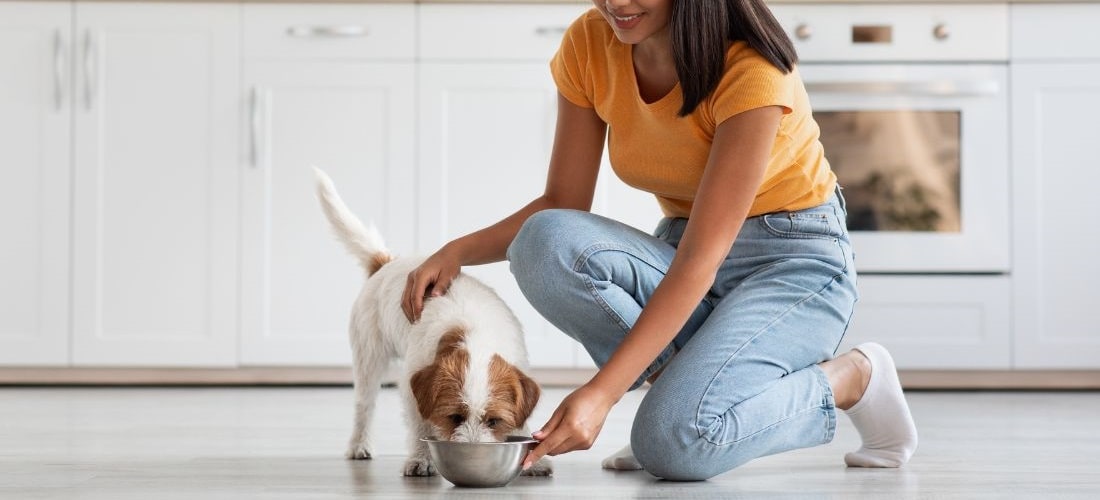
Dogs are omnivores, meaning they can eat meat and plant-based foods. Before selecting a diet for your dog, check it meets the following criteria:
- Complete: A balanced diet starts with food that contains the ‘complete’ label. This means that it contains all the nutrients that your dog needs, in the correct amounts.
- Commercially made: Homemade dog food is extremely difficult to get right, so we recommend buying a commercial food rather than making your own. Check out the specially selected range of dog food in our PDSA Pet Store.
- Approved by ‘UK Pet Food’: Always look for food that has been approved by 'UK Pet Food’. Members of this organisation produce food guaranteed to meet all your dog’s nutritional needs, and also meet extra quality standards than the legal minimum.
- Life stage appropriate: Ensure you're feeding your dog a food that’s appropriate for their present life stage (puppy, adult, or senior). For further details, refer to our life stage feeding guide below.
- Wet or dry: Unless your vet has said otherwise, your dog can have wet food, dry food, or a combination of the two. If you feed a combination, you’ll just need to make sure that you’re giving them the right amount by looking at the packets and working out their portion sizes.
- Flavours: There are a variety of dog food flavours and textures. Some prefer to stick to the same food every day, whereas others enjoy a variety. It doesn’t matter what flavours and textures you choose as long as your dog is happy.
If you are worried about which diet to choose, speak to your vet or vet nurse and they will be happy to provide advice on your dog’s individual needs.
 Video found at youtu.be/K4wptnbmOSU
Video found at youtu.be/K4wptnbmOSU
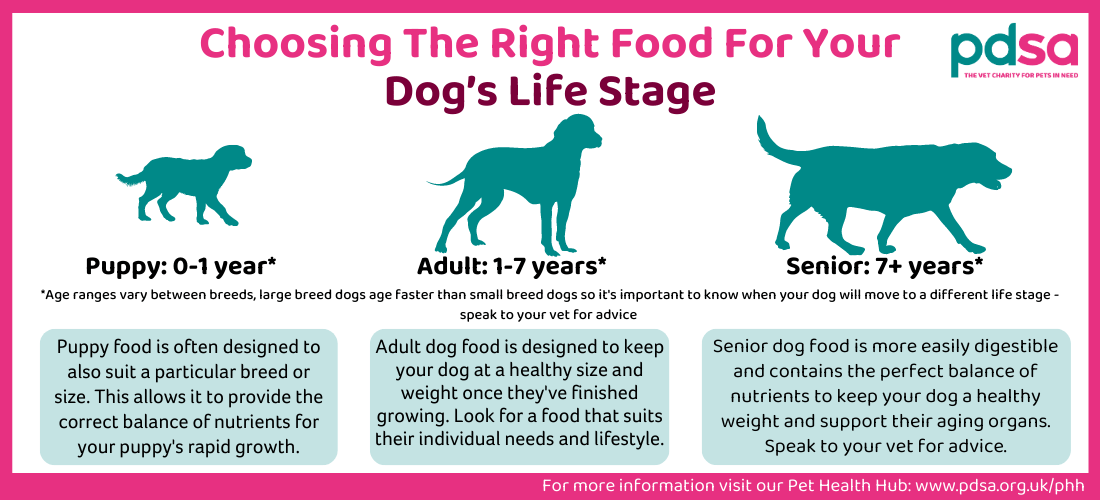
As your dog grows and changes throughout their life, their nutritional requirements will change too. Thankfully, many commercial dog food companies have created food for specific age groups, known as the ‘life stage’ diets, to make sure every dog gets the right balance of nutrients:
Feeding a puppy
- Feeding your growing puppy a complete food, suitable for their size is crucial for their development.
- While your puppy settles in, stick to the breeder's food and feeding routine. Then, if you want to change to a new food, introduce it very slowly over a couple of weeks, using our guide below.
- As your puppy ages, adjust the amount of food accordingly, and regularly weigh them to monitor their growth.
- Consult your vet if you have any concerns about your puppy's diet and well-being.
- Want to know more about feeding your puppy? Read our Vet Q&A new puppy questions post.
Feeding an adult dog
- Once your dog is fully grown, they can transition to an adult dog food.
- There are plenty of different foods available, just make sure the one you choose it’s complete, commercially produced, and ‘UK Pet Food’ approved.
- If necessary, you can also tailor your dog’s diet to their individual needs and lifestyle. For example, there are foods designed for neutered dogs, dogs that are very active, and dogs that need to lose weight. If you’re not sure which diet is best for your dog, ask your vet for help.
Feeding a senior dog
- Once your dog has reached approximately half their life expectancy, they can be transitioned on to a ‘senior/mature’ dog food.
- This is around seven-years-old for small dogs and five-years-old for larger dogs.
- There are also foods available for senior dogs, which are designed for the last few years of life.
- Older dog diets tend to be easily digestible, support joint health, and contain reduce nutrients that may be challenging for older dogs to process.
- Be sure to monitor your older dog closely to check how much they’re eating and drinking each day. Eating less or drinking more than usual can be a symptom of problems such as arthritis or dental problems. If you have any concerns, be sure to contact your vet for advice.
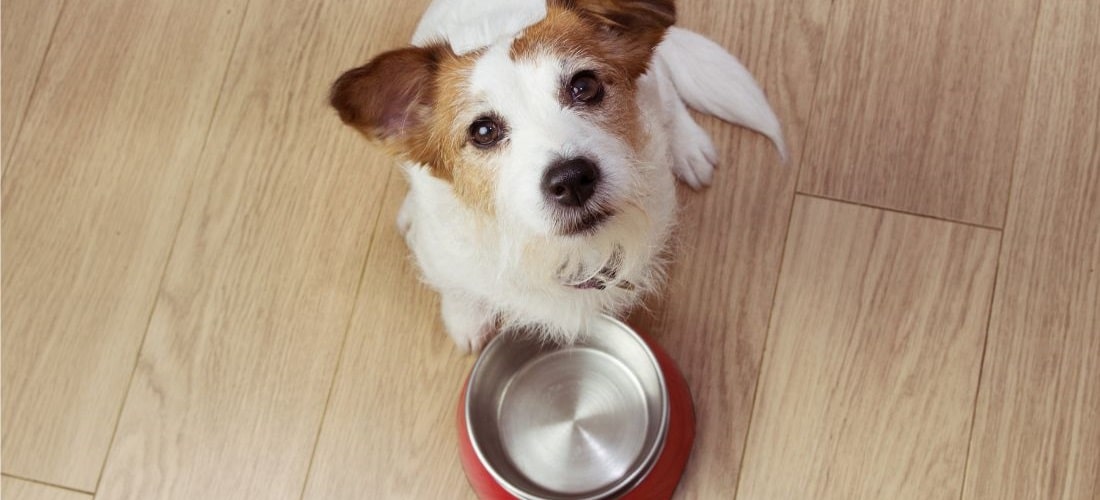
Serving the right amount of food to your dog is important to prevent them becoming overweight.
Use the guidelines on the packet as a starting point and if they need to lose or gain weight, you’ll need to feed them for their target weight, which might not be their current weight.
It's a good idea to weigh their portion each day to make sure they’re getting exactly the right amount. We also recommend making sure they aren’t getting extra food from other members of the household or neighbours.
For most dogs, it’s not a good idea to leave food out all day as it could lead to overeating. This is also known as free feeding and is only recommended for dogs with an active lifestyle or those who struggle to maintain a healthy weight. Be sure to contact your vet if you need help tailoring your dog’s feeding plan.
 Video found at youtu.be/eZSrM2lZ0yo
Video found at youtu.be/eZSrM2lZ0yo
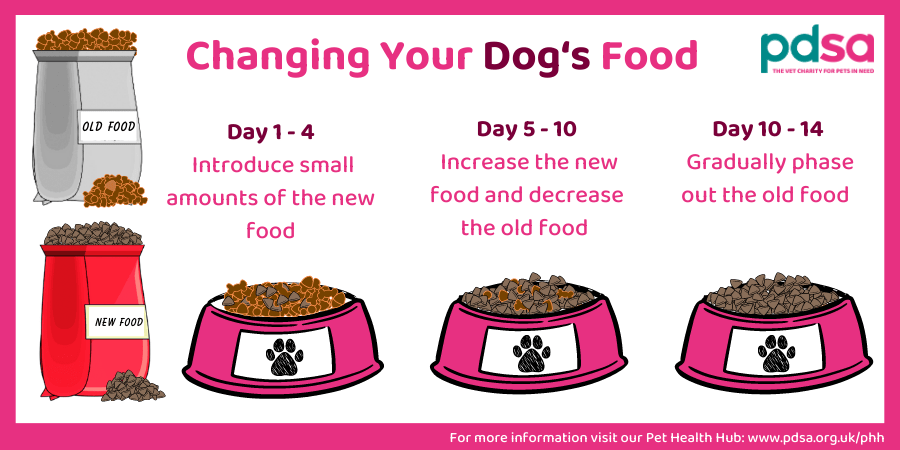
If you want to switch your dog's food, do it gradually over a couple of weeks to prevent issues. Avoid sudden changes (unless advised by your vet), as it can cause tummy upsets or refusal to eat. Here are some simple steps to help your dog adjust to new food:
- Introduce small amounts of the new food (Day 1-3): Give your dog their regular meal but add a small teaspoonful of their new food on a separate plate or bowl. Don’t mix the foods together.
- Increase the amount of new food and decrease the old food (Day 4-10): Start by mixing a very small amount of the new diet in with the old one. If adding the new food goes well, then slowly increase the portion of the new food whilst decreasing the old food.
- Gradually phase out the old food (Day 10-14): Once your pet is consistently eating the mix of the new food with the old for at least a week, start phasing out the old food.
Picking healthy treats for your dog
Giving your dog the odd healthy treat is fine, but too many could cause them to become overweight. Remember that there are lots of other ways to show your love to your dog, such as playing with them, taking them for a walk, buying them a new toy or grooming them.
When you give your dog a treat, make sure to reduce their meals accordingly.
You can buy vet approved treats and chews for your dog, or find something safe and tasty from your kitchen. As well as small pieces of lean meat (such as cooked chicken breast, turkey or ham), there are plenty of fruit and veg that are safe and healthy for the occasional treat.
What vegetables can dogs eat?
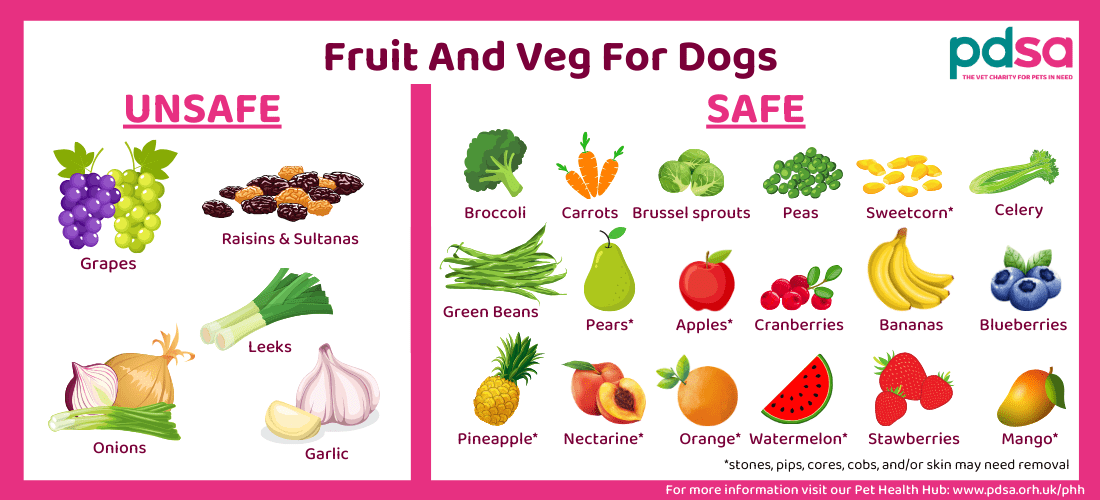
Dogs don’t need fruit or vegetables as part of their diet, but can have a small amount as an occasional treat. Just make sure whatever you give them is in bite-sized pieces, seedless, and doesn’t have any oil, butter, salt, or flavourings on it. These are our dog-friendly vegetable suggestions:
- Broccoli: raw or steamed, and only in very small quantities because large amounts can cause illness.
- Brussel sprouts: steamed or boiled, and only in very small quantities because large amounts can cause illness.
- Carrots: raw or cooked.
- Celery: raw as a crunchy snack.
- Green beans: raw or cooked.
- Peas: raw or cooked.
- Potatoes: raw potatoes contain a compound called ‘solanine’ that is toxic to dogs, so should never be given. Cooking potatoes destroys much of their toxicity, but they should only ever be given in small quantities, without any oil, butter, salt or seasoning. It’s best to remove the skin because it can cause tummy upsets in some dogs, and remember to feed bite sized pieces to avoid choking.
- Sweet potatoes: cooked and peeled because some dogs find the skin difficult to digest.
- Sweetcorn: cooked and cut off from the cob, as the cob can cause gastrointestinal obstruction.
What fruit can dogs eat?
There are several different fruit that dogs can eat safely, but they should only ever be given in very small quantities as an occasional treat because most of them contain high levels of sugar. As with vegetables, make sure that any fruit you give your dog is plain, cut into bite-sized pieces, and is free from pips/stones/seeds to avoid choking. Here are our dog-friendly fruit suggestions:
- Apples: de-seeded and cored
- Bananas: peeled
- Blueberries
- Cranberries
- Strawberries
- Mango: stone and skin removed
- Nectarine: stone removed
- Orange: skin and seeds removed
- Peach: stone removed
- Pears: seeds, core and pit removed
- Pineapple: skin removed
- Melon: rind and seeds removed
What human food should I avoid feeding dogs?
Our vets don’t recommend feeding your dog any of the foods/drinks listed below:
- Chocolate – chocolate toxicity depends on the type of chocolate eaten, the amount of chocolate eaten, and the size of your dog. Signs can include vomiting, diarrhoea, hyperactivity and tachycardia.
- Grapes, raisins, currants, and sultanas – can cause kidney failure
- Onion, garlic, and leeks – can cause severe, life threatening anaemia
- Xylitol – a sweetener which can cause a severe drop in blood sugar and liver failure in dogs.
- Macadamia nuts – amongst other symptoms, these can cause weakness, stiffness, tremors, and an increase in body temperature.
- Alcohol – affects the nervous system, can cause drowsiness, low body temperature, low blood sugar, and even coma.
- Caffeine – can cause overstimulation of the nervous system, muscles and heart.
- Mouldy food waste – contain mycotoxins that can cause vomiting, whole body muscle tremors, increased body temperature and potentially seizures (fits).
Can I feed my dog a vegetarian/vegan diet?
If you’re vegan or vegetarian, feeding your dog can be a real moral dilemma. Dogs are omnivores, so it is possible to feed them a commercial vegetarian or vegan dog food – just make sure it’s complete, commercially made, approved by ‘UK Pet Foods’ and life stage appropriate. Always speak to your vet before switching your dog to a vegetarian or plant-based food to make sure it’s appropriate.
Can I feed my dog a raw diet?
For those interested in a raw dog diet, we recommend opting for commercially prepared and complete options available in stores to ensure proper nutrient intake. Avoid making homemade raw diets and consult your vet first.
This article was written by PDSA vets and nurses, in conjunction with Animal PoisonLine - www.animalpoisonline.co.uk

